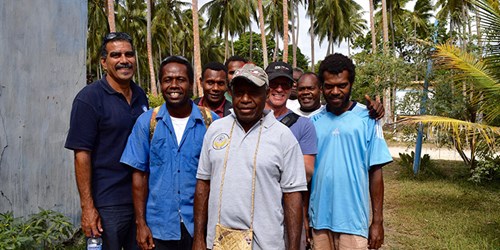The international market for exports is fiercely competitive, and the Pacific Islands must also contend with high road and inter-island transportation costs. Third-party organic certification, especially in the agriculture sector can make a financial difference for growers and what they receive at the farm gate.
In Vanuatu, traditional copra (dried coconut) farming feels like living in ‘agricultural poverty’. The work is both physically intensive and time intensive, with a very low return of sale at the farm gate.
Pacific Trade Invest (PTI) Australia has worked with grower groups in Vanuatu since 2012, supporting the Vanuatu Organic Coconut Initiative. The aim of the initiative is to have 10,000 farmers obtain organic certification, to increase revenue and work towards the eradication of agricultural poverty in Vanuatu.
The initiative is the vision of Hon. Ian Wilson, a ni-Vanuatu farmer and member of parliament for Maewo Island, and is coordinated by Andreas B Lombardozzi, African Pacific, a company that facilitates and integrates small agricultural farmers and international customers to achieve a farmer-focused customer relationship.
In 2017, with the support of PTI Australia, three Vanuatu growing groups – Malekula Organic Growers Group, Sanma Organic Grower Group and Maewo Organic Grower Group College – collaborated with African Pacific to streamline the process of obtaining third-party certification through Australian Certified Organic (ACO) This IFOAM accredited third-party certification enables grower groups to sell their goods as organic produce to the international market, in EU, Australia, USA and most recently China.
Mr Lombardozzi said third-party organic certification has seen an increase in earnings for the farmers.
‘With the organic certification, farmers earn US$50.00 per metre more – a net increase of approximately 15% at farm gate. We had some quality issues in organic copra production, which limited the premium to US$50.00; however, with investments in new drying systems this year, and our buyer investing in a refinery in Melbourne, we hope that over this year we will be able to increase the premium to US$100.00 per metre, which will significantly increase the farm gate prices for organic copra.
‘An added advantage of the organic certification is that all other crops (cocoa, fruit, nuts, beef, kava etc.) can also be certified organic under the same process. This allows farmers greater access to additional markets and improved earnings, not just on the coconuts, but all agricultural production on their land.
We’ve seen this with the Malekula Organic Growers Group, which has established a market for both their coconuts and cocoa in Europe and USA. ‘Organic certification works really well within the community culture of Vanuatu, allowing farmers to work together in their community and sell as a group into the international market.
‘Organic certification not only helps communities earn an increased and more stable return at farm gate; it gives them an opportunity to build longer term agricultural plans, giving families and communities financial stability over time and allowing them to invest with greater confidence into more significant and value-adding projects.
Due to the organic community farming system established in Maewo, the Maewo Organic Growers Group was nominated for the NZ Aid/VanGov agri-projects and received a tractor to continue building and investing in organic agriculture on the island. George Moli a local consultant working with the Growers Groups to achieve improved certification outcomes had seen the direct positive impact on communities.
‘In Sanma, we have seen the increased earnings from organic certification taking pressure off parents to pay school fees and health services for their families. The ability to pay for improved education for their children is one of the most important motivations to achieve organic certification and will, over time, have a great beneficial impact on communities.’
Even with the proven financial benefit of third-party organic certification, farmers and grower groups face significant hurdles in gaining and retaining certification. The main barriers are the cost of certification, which involves creating an Internal Control System within the group (a required track-and-trace system for each farmer); the initial and ongoing training for the farmers in the group; and getting third-party organic certification for the group.
The current cost is around AU$10,000 for 500 farmers (AU$20 per farmer) just for the third-party certification. As organic farmer numbers grow, Mr Lombardozzi hopes the system will reduce this cost to around AU$5.00 per farmers, thus making it more accessible for farmers to join and certify their produce.
‘In order to move forward with investing in organic certification training, we hope to have each year, starting in April, an Organic Agriculture Training Week in which we can bring trainers to Vanuatu and train admin officers, coordinators and farmers to improve their knowledge in organic admin and farming methods, to continue to build on the growth of our current platform and to reach our goal of certifying 10 000 farmers,’ Mr Lombardozzi said.
-------------------
Published February 2018








